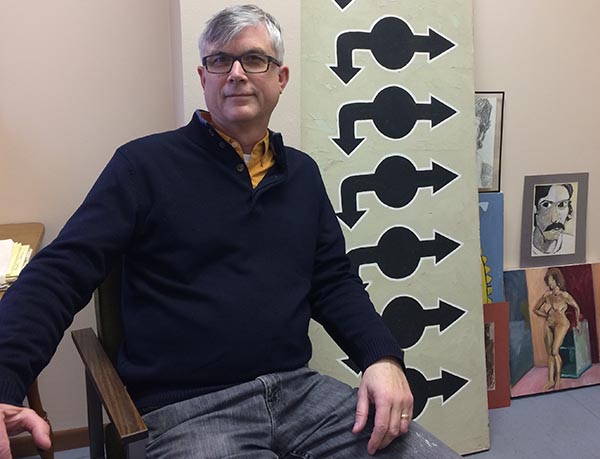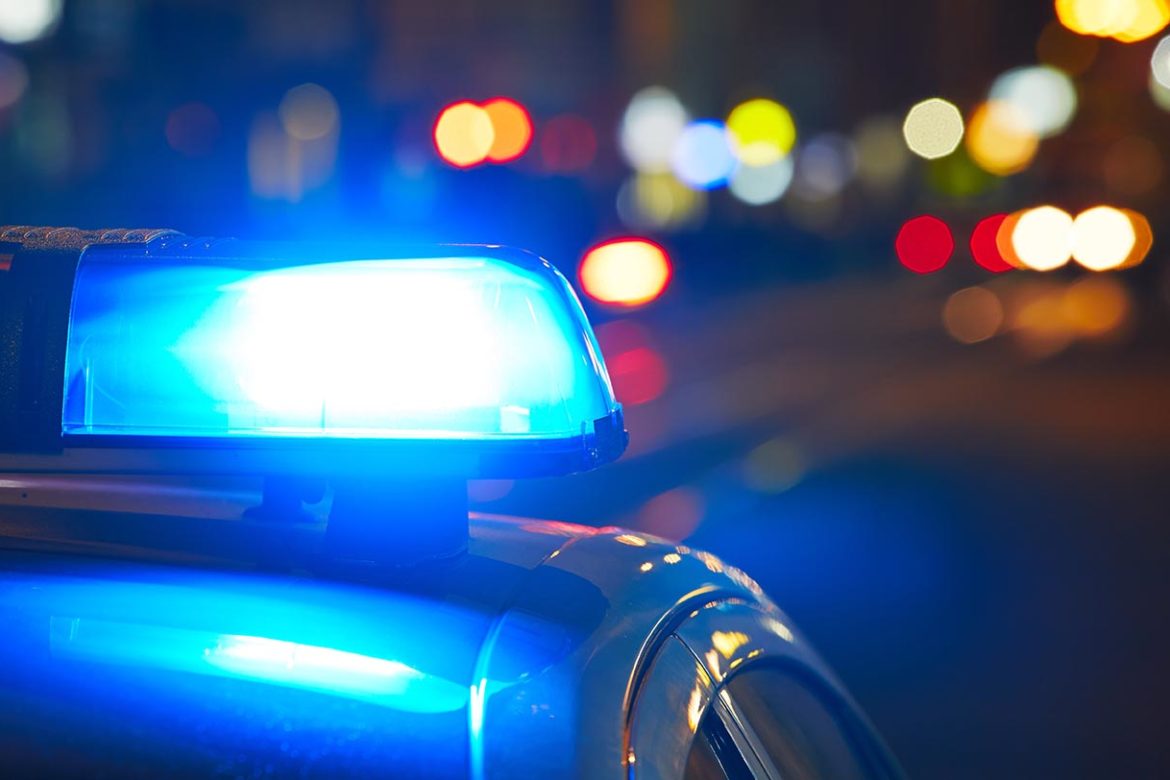After the ride-along they handed me off to these other two cops because I told them I was a writer, that I was writing a book. It wasn’t completely a lie. I was taking my second creative writing class in this, the seventh, or maybe it was the eighth year of my campaign to earn a four-year undergraduate degree at Wayne State University.
These two cops were white, beefy, walking, talking grins with badges and brush cuts. Unlike the ride-along cops they were plainclothes. Detectives? Maybe Vice? They didn’t say. Or maybe they did, I don’t remember, it was a long time ago. For some reason they seemed Canadian to me. I don’t know, just something about them. My Canuck radar was tingling.
Police stations are twenty-four-seven environments. Like casinos but with really bad lighting and cheap, hung ceiling tiles like the ones your dad put up over the duct work in the basement when you were a kid. No one glanced at me as we walked through the station.
“I’m with them. I’m supposed to be here. I’m one of the Canadian cops.”
Okay, they probably weren’t really Canadian. Maybe I just remember it that way.
They were excited as we clambered up the stairs to the second floor. “You have to write about this. You have to fucking write about this.”
We slipped into a murky, unlit room without knocking. The cramped space was already occupied by seven or eight cops crowded around what at first appeared to be a large picture window—a two-way mirror. The flickering light coming from the other side of the glass provided the only illumination as we scraped along one wall and colonized the corner of the room just to one side of the mirror. I was trapped, wedged between the wall, my two sturdy escorts, and the window. There was a scrum of cops in the darkness between me and the door. My face was very close to the glass.
No one spoke. We could have been an anonymous group of strangers viewing an exhibit of sturgeons and box turtles in the city’s dilapidated Belle Isle aquarium. On the other side of the glass was a small table. Two bone skinny little white boys were seated on the opposite side, facing us. They were emaciated, almost wraith-like, one several years older than the other. The boys had blankets wrapped around their frail shoulders. Their scalps were blotchy, freshly shaved. Seated at a diagonal from them, closer to the younger boy, was a black lady in a suit, a cop or a social worker maybe. When she turned to glance in the direction of the mirror I flinched. It was as if she was reacting to my gaze, like the driver of the car in the next lane at a stoplight.
The beefy hand of one of my detective bookends gripped my shoulder and I relaxed. I was jammed into the corner of a dark room, a dark room full of cops. I was invisible.
Their conversation was piped to our side of the mirror through a wall mounted speaker that wouldn’t have looked out of place in an elementary school cafeteria. The voices from the adjoining room had the distant, slightly garbled quality of a bank teller at a drive-in window. The boys were telling the lady about where they went to the bathroom. It was all very matter of fact. They used their bedroom as a toilet. Some times the sink in the kitchen. They never used the bathroom, they were too scared to go in there. This, apparently, had been going on for a very long time.
I pressed myself against the wall, embarrassed, not sure why I was there, expecting any moment to be told to leave. I was hoping someone would tell me to leave. That’s when I noticed the odor. There was a stench so utterly rancid emanating from the adjoining room that it was seeping through the gaps where the mirror was framed to the wall. I realized the black lady had a dab of Vaseline on her upper lip. My two cops were breathing behind their cupped hands. I did the same. At first I had thought the boys were wearing long underwear under the blankets but now I realized that their flesh was covered in this thick, encaustic coating of… God, I don’t know… Grime? Dried mud? Petrified shit? Something, all the way up their necks to where their faces had been scrubbed, scraped clean.
I find myself staring at the first cop’s shoes. He’s wearing brown loafers. With tassels. Jesus, fuck, they must be Canadian. But, then again, maybe not. His socks are thick-n-thins. I thought only greasers wore those. And the black guys in the pool hall who try to sell you men’s suits still in the boxes from Crowley’s.
They’re talking about sex now. These two little boys know a lot about sex. The older boy answers the lady’s questions in a dull voice, completely monosyllabic. The younger boy grins a lot, he wants to please. He is clearly smitten with the black lady. He smiles at her. He tells her how they bring men there for sex. I can’t help feeling nauseated. People go there and have sex? In a room, on a bed two little boys have been using for a toilet? For God knows how long? Jesus, that’s disgusting. Then I feel miserable for feeling that way. Does this make me a bad person?
The younger boy has impossibly small, even teeth. Like a doll. They creep me out. The lady calls him “my little man”. She tells him what a good job he’s doing, how brave he is. The older boy scowls, already a cynic.
The little boy is very serious now, very polite. He asks the lady if she wants him to give her sex. Apparently, he knows something about girls too. The lady doesn’t answer him, just turns away and stares at the mirror. At me. She’s looking right at me, I’m sure of it. Maybe this isn’t really a two-way mirror. Maybe it’s just an ordinary fucking window. I try to squirm out of her line of sight but I’m trapped between the wall and the cop pressed up against my shoulder.
“It’s okay, she can’t see me.” I repeat it under my breath like a prayer. I wonder if anyone else in the room is seeing what I’m seeing: On the other side of the glass the look in the woman’s eyes is one of desolation. End of the world, the bomb has dropped, we’re all fucked, utter, complete desolation. The silence on my side of the glass is broken by the rasp of a shoe scraping the tile floor, the creak of leather stressed by a rigid arm leaning into a holster, a strangled cough. The hand over my mouth is the only thing that stops me from busting out, “I’m sorry. I shouldn’t be here. I don’t know why I’m here. I…”
She turns back to the little boy. I’m not sure, but it seems as if, maybe, just the barest suggestion of a smile has briefly readjusted the corners of her mouth. “No thank you little man.” The little boy smiles at her. I’d tell you his smile lit up the room but that would be a cliché. Besides, those teeth creep me out.
Later, stomping down the stairs, the two cops are looking back over their shoulders at me. “You have to write about this. You have to fucking write about this. These are white people. These are fucking white people.”
No, they’re definitely not Canadian. These are my homeboys. This is Detroit.

Peter O’Keefe is a writer and filmmaker, born and raised in Detroit, now living in Racine, Wisconsin. In a previous life, Peter worked in episodic television and feature films, wrote TV movies for German networks, and scripted direct-to-video movies for Hollywood schlockmeisters under an assumed name. His narrative short films have screened at a variety of film festivals and other venues and he has written, produced and directed hundreds of commercials, marketing videos, industrials and educational videos.
Peter’s full-length play about the 1967 Detroit riots, “The Algiers Motel”, has received staged readings at theaters in New York, Chicago and South Bend, Indiana. His short play “The Brotherhood of Man” was a finalist for the Humana Theatre Festival’s Heideman award. Peter’s documentary about visual artists in the Midwest, “Dreaming In Public, Making Art In the Real World”, was recently awarded a Midwest/Chicago Emmy. His short stories have appeared in various literary and online journals.
Two Questions with Peter O’Keefe:
TD: Tell us a little about this story? Where did the idea come from?
PO: I grew up in Detroit. I spent the bulk of my twenties living in the (at that time) bleak Cass Corridor neighborhood near downtown and working toward a BFA at Wayne State University. At one point I shared an apartment with a former Detroit policeman and, as a result, spent a lot of time smoking dope and doing tequila shots with off-duty cops. The Ride-Along was inspired by those cops and the stories they told in an effort to shock and/or impress a long-haired, baby-faced, aspiring writer and art student. Some of them may have even been true.
TD: What is your favorite place to write and why?
PO: I do some of my best writing in coffee shops. Maybe it’s the result of growing up in a family of ten in a not very large house but I need that sense of life going on around me while I work.
I also move around a lot. I rotate between my kitchen table, various coffee shops, and the tiny office I keep in an old factory building filled with artist lofts and small manufacturers. I find it particularly helpful to change locations when I’m switching over to a different project, or moving on to a new section or draft of a larger project.



COMMENTS ARE OFF THIS POST